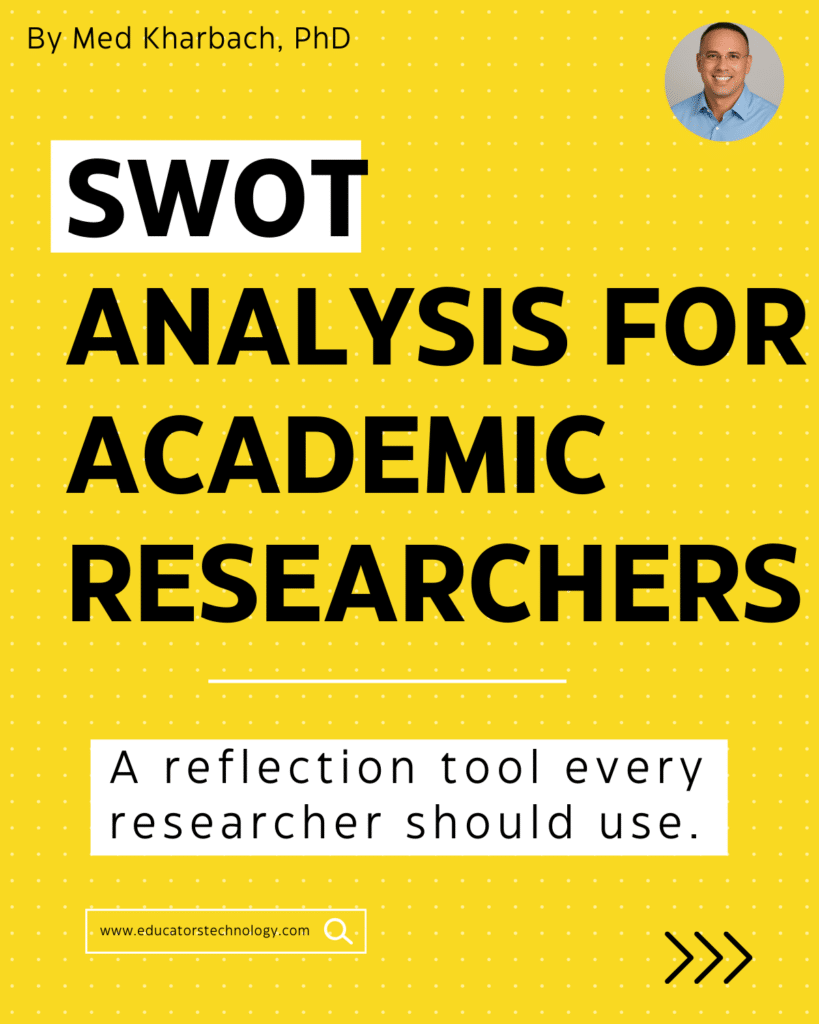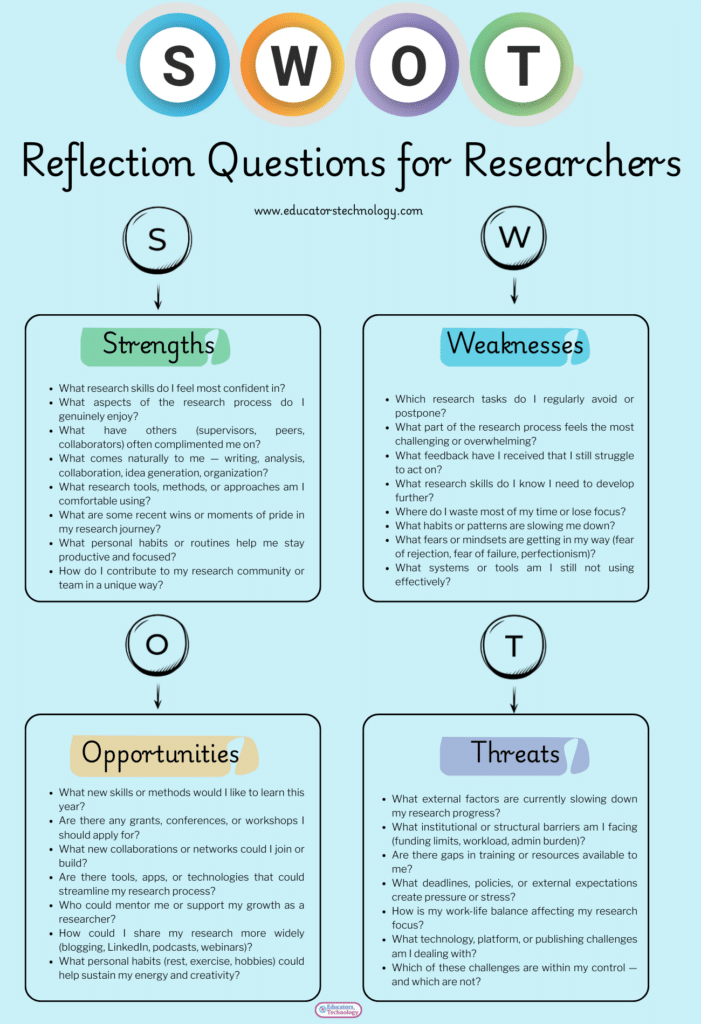After writing about the SWOT framework for teachers and exploring how educators can use it to reflect and grow, I started thinking — why not adapt the same framework for academic researchers like us?
At the end of the day, SWOT is just a thinking tool. A simple heuristic to help you pause, reflect, and make sense of where you are and where you want to go. Yes, it originally came from the world of business and finance, but its value has long gone beyond that. It’s now used across different fields, from education to healthcare to personal development and I believe research is no exception.
As researchers, we often move from one deadline to another without much time to pause and reflect. But SWOT gives you that structure. It helps you step back and ask:
→ What am I good at?
→ Where do I struggle?
→ What opportunities can I explore?
→ What limitations do I need to navigate?
And just like I argued in my SWOT for Teachers post, I think this framework is not only useful for professional reflection but also for personal well-being. Because let’s face it: if your health, energy, and emotional well-being are falling apart, no research strategy in the world is going to help.
So when I talk about using SWOT for researchers, I’m talking about the full picture, your research practice and your well-being. Both matter. Both deserve attention.

SWOT for Academic Researchers
Now let’s break down the various ways we can use SWOT framework to help you in yor research journey and beyond.
1. Strengths
This is the part where you pause for a moment and ask yourself: What am I actually good at as a researcher?
It sounds like a simple question, but it’s not always easy to answer. We are often too busy chasing deadlines to stop and notice our own strengths.
But I believe this is where a SWOT analysis really starts to pay off because recognizing your strengths is not about bragging. It’s about knowing what you can rely on when things get hard. It’s about building on what’s already working.
So think about it:
→ Are you a strong writer?
→ Are you good at close reading and critical analysis?
→ Do you have a solid note-taking or literature tracking system?
→ Are you skilled at data analysis or coding?
→ Are you good at collaborating and networking with other researchers?
→ Are you great at designing clear presentations or explaining complex ideas simply?
Whatever comes to mind here is worth writing down.
But don’t stop there.
The next question is: How can I develop these strengths even further?
Skills, even natural ones, don’t grow on autopilot. They need deliberate practice.
If writing is your strength maybe it’s time to start sharing more of it through blogs, articles, or social media posts. If data analysis is your thing maybe you could take an advanced workshop or share tutorials with your peers. If collaboration comes easily to you maybe it’s time to lead a small research group or mentor a younger student.
2. Weaknesses
Now comes the uncomfortable part identifying the things you need to work on.
Nobody likes to sit down and think about their weak spots. But as far as I am concerned, this is one of the most valuable parts of doing a SWOT analysis.
This is where you slow down and ask yourself:
What am I struggling with right now in my research practice?
It could be things like:
→ Imposter syndrome — always feeling like you’re not good enough
→ Poor time management — always rushing or working last minute
→ Procrastination — delaying tasks you know you should start
→ Writing struggles — staring at a blank page forever
→ Lack of confidence — in presenting, publishing, or sharing your ideas
→ Disorganization — losing track of notes, papers, or tasks
→ Struggling with feedback — taking criticism personally
Whatever it is name it. Write it down. Be honest with yourself.
But don’t stop there. The key question is: Why am I struggling with this?
Ask yourself:
- What’s really behind this problem?
- Is it lack of skill?
- Is it fear of failure?
- Is it lack of clear systems?
- Is it burnout or exhaustion?
- Is it poor habits built over time?
And then ask: What could I do differently?
Sometimes it’s small changes:
→ Time blocking your calendar
→ Creating a simple writing routine
→ Setting realistic daily goals
→ Talking to peers or mentors
→ Joining writing groups
→ Learning new tools
→ Letting go of perfectionism
The point here is not to feel bad about your weaknesses. We all have them. The point is to see them clearly because once you see them, you can work on them. Weaknesses lose their power over you the moment you stop ignoring them.
3. Opportunities
This is probably my favourite part of the SWOT analysis because this is where you shift from looking inward to looking outward.
This is where you think about growth. About possibilities. About what’s out there that you haven’t explored yet but could really help you level up as a researcher.
Ask yourself: What opportunities are available to me right now that I might be missing?
These could be big or small. Formal or informal. Long-term or quick wins.
Some examples:
→ Upcoming funding calls that fit your research interests
→ New research projects or collaborations you could join
→ Writing retreats, workshops, or bootcamps to improve your academic writing
→ Research networks or communities to connect with like-minded scholars
→ Co-authoring opportunities with colleagues or mentors
→ Conferences and webinars to present or learn from
→ New AI tools or research software that could save you time or open new possibilities
→ Growing your online academic presence (LinkedIn, ResearchGate, personal website)
→ Social networking with fellow researchers to exchange ideas and stay connected
The goal here is to start thinking like this: Where do I want to go next? And what’s out there that could help me get there faster or better? Opportunities rarely knock on your door. Most of the time, you have to go looking for them.
But when you develop the habit of scanning your environment for growth possibilities you stop feeling stuck and start seeing pathways everywhere.
That’s the mindset I think every researcher needs to build.

4. Weaknesses
Now it’s time to face the hard stuff the things that hold you back no matter how good or motivated you are.
I like to think of this part of SWOT as dealing with roadblocks. Things you didn’t create. Things you often can’t control. But things that affect your research life anyway.
Every researcher faces these.
Some common examples:
→ Peer review delays that slow down your publications
→ Administrative overload that eats into your research time
→ Limited funding or shrinking grants
→ Teaching responsibilities that leave little time for writing
→ Tech changes or platform updates that mess up your systems
→ Shifting institutional priorities
→ Lack of training or support for new tools like AI
→ Bureaucratic hurdles that block simple things
In my opinion, this is where you need to be really honest with yourself:
→ What’s truly outside my control?
→ What small part of this can I still influence?
→ What creative workarounds can I try?
→ What do I need to accept (for now) without draining my energy?
Some things you can’t fix and that’s okay. But many things you can work around.
You can’t speed up peer review — but you can have multiple papers in the pipeline.
You can’t eliminate admin work — but you can set protected research hours.
You can’t control funding cuts — but you can diversify your sources or scale down projects.
You can’t stop tech changes — but you can keep learning and stay flexible.
The key is to shift your focus from frustration to strategy.
Not everything will go your way in academia but knowing what you can control and where to place your energy makes all the difference.
Conclusion
At the end of the day, I think SWOT analysis is not just a business tool we borrowed for fun. It’s a mindset. A way of slowing down, reflecting, and looking at your research life with clarity. Academic research is messy. It’s rarely linear. It’s full of wins and losses, progress and setbacks, ideas and dead-ends.
That’s why I believe every researcher should take the time, every now and then, to pause and engage in a SWOT analysis asking questions like
→ What am I good at?
→ Where am I struggling?
→ What opportunities should I explore?
→ What limitations do I need to navigate?
Doing a SWOT analysis won’t magically fix all your research problems. But it will give you perspective. And perspective is powerful. It helps you notice patterns. It helps you spot growth areas. It helps you plan better and react less.
Most importantly, it reminds you that your research journey is not just about publishing papers or collecting citations. It’s also about growing as a researcher, a learner, and a person. And that, in my view, is reason enough to grab a piece of paper, draw that SWOT grid, and start reflecting.
The post SWOT Analysis for Academic Researchers: A Practical Reflection Tool appeared first on Educators Technology.